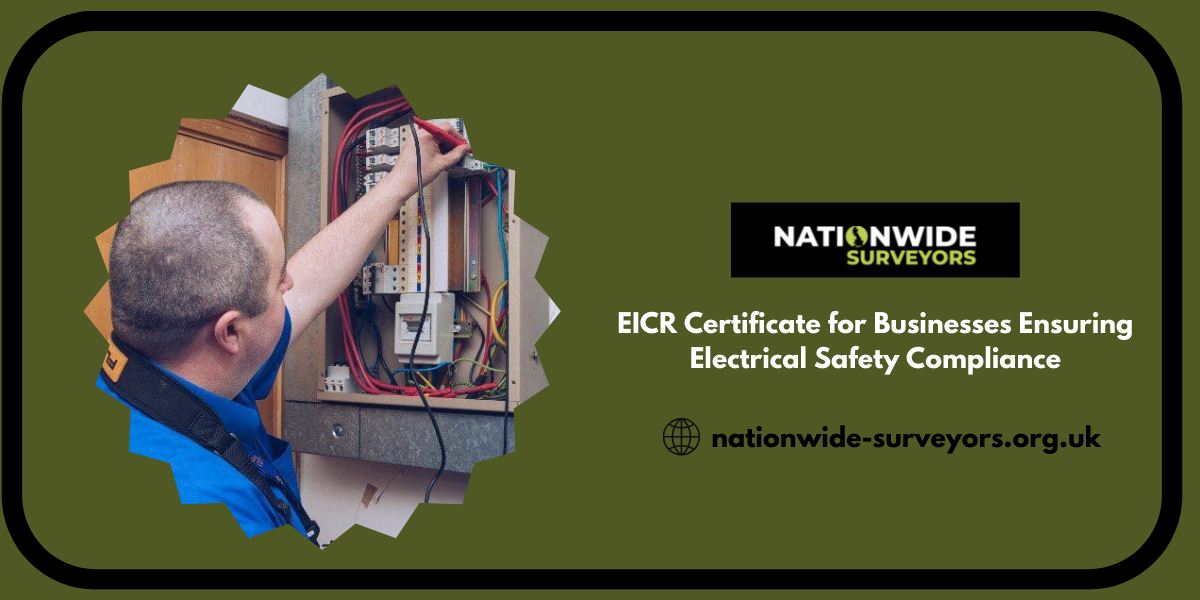
In today’s fast-paced commercial world, ensuring electrical safety is a critical responsibility for every business owner. One of the best ways to achieve this is by conducting an EICR test (Electrical Installation Condition Report), which evaluates the safety and integrity of electrical systems within a property. At Nationwide Surveyors, we understand the importance of maintaining compliance with legal regulations while safeguarding employees, customers, and assets.
What is an EICR Certificate?
An Electrical Installation Condition Report (EICR) is an official document produced after an inspection of a property’s electrical installations. This report highlights any defects, deterioration, or potential hazards within the system, ensuring that businesses adhere to the required electrical safety standards.
Why is an EICR Certificate Essential for Businesses?
Every commercial establishment relies heavily on electrical systems to operate efficiently. Whether it’s an office, retail store, warehouse, or industrial unit, electrical installations must be periodically checked to prevent accidents, fires, or compliance violations. Below are some key reasons why businesses should prioritize an EICR certificate:
- Legal Compliance
- Businesses are legally required to ensure their electrical installations are safe. The Electricity at Work Regulations 1989 mandates that employers maintain electrical systems in a safe condition to prevent any risks. Failure to comply could result in legal consequences, fines, or even prosecution.
- Safety of Employees and Customers
- Faulty electrical installations can lead to severe hazards such as electrical shocks, short circuits, and fires. Regular inspections help identify these issues before they escalate, ensuring a safe environment for employees and customers.
- Insurance Requirements
- Many insurance companies require an up-to-date EICR certificate before offering coverage. In case of an electrical-related incident, a lack of compliance may result in rejected claims, leaving businesses financially vulnerable.
- Preventing Costly Downtime
- Electrical failures can disrupt business operations, leading to costly downtime. Routine inspections can detect potential faults early, allowing for necessary repairs and uninterrupted workflow.
- Improving Energy Efficiency
An EICR test can also help businesses identify inefficiencies within their electrical system, such as overloaded circuits or outdated wiring. Addressing these issues can lead to energy savings and reduced operational costs.
What Does an EICR Test Involve?
The EICR inspection process consists of several steps to ensure a thorough evaluation of the electrical system:
- Visual Inspection – Examining electrical installations for wear and tear, visible damage, or outdated components.
- Electrical Testing – Conducting tests on circuits, outlets, and fuse boards to check for faults, inefficiencies, or safety risks.
- Identification of Defects – Highlighting any issues categorized under different codes:
- Code C1: Immediate danger – urgent action required.
- Code C2: Potential hazard – remedial work necessary.
- Code C3: Improvement recommended – not immediately dangerous but requires attention.
- Issuance of the Report – The final report includes details of findings, recommended actions, and confirmation of whether the installation is satisfactory or requires further work.
How Often Should Businesses Conduct an EICR Test?
The frequency of an EICR test depends on the type of business and the nature of electrical usage. Below are general recommendations:
- Offices and retail stores: Every 5 years
- Industrial premises: Every 3 years
- Hotels and restaurants: Every 5 years
- Educational institutions: Every 5 years
- Public buildings: Every 5 years
- Construction sites: Every 3 years
Businesses operating in high-risk environments, such as factories or warehouses with heavy machinery, may require more frequent inspections.
Choosing a Qualified Inspector for Your EICR Test
Hiring a certified and experienced professional is crucial to ensure an accurate and reliable assessment. At Nationwide Surveyors, our team of skilled electricians and surveyors are trained to conduct EICR inspections with precision, adhering to the highest industry standards. Our services include:
- Comprehensive electrical inspections
- Detailed reports with clear recommendations
- Expert advice on necessary remedial actions
- Assistance with compliance documentation
Steps to Take After Receiving an EICR Report
After receiving your EICR report, the next steps depend on the results:
- Satisfactory Report: No immediate action required, but ensure the next scheduled test is planned in accordance with recommended timelines.
- Unsatisfactory Report: If issues are identified, businesses must undertake the necessary remedial work within the recommended timeframe to maintain compliance and safety.
Cost of an EICR Test for Businesses
The cost of an EICR test varies based on several factors, including the size of the property, the complexity of electrical installations, and the location. However, investing in regular inspections is a small price to pay compared to the potential financial and legal consequences of neglecting electrical safety.
Conclusion
Ensuring electrical safety compliance through an EICR test is a vital responsibility for businesses. Regular inspections not only help maintain legal compliance but also protect employees, customers, and assets from potential electrical hazards. At Nationwide Surveyors, we specialize in providing comprehensive EICR testing services to help businesses stay compliant and secure. Contact us today to schedule your EICR inspection and ensure your electrical systems meet the highest safety standards.